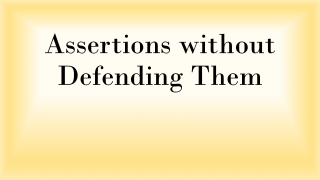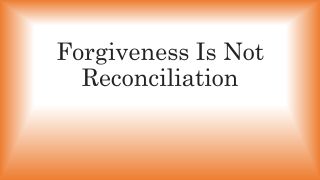Forgiveness
What Is Forgiveness? Too Many Assert and Do Not Defend
Assertion without defense leads to misinformation for people seeking to forgive.
Posted March 18, 2023 Reviewed by Abigail Fagan
Lately I have been reading works about forgiveness that are uncomplimentary in criticizing this potentially helpful response to unjust treatment by others. Some talk of “toxic forgiveness” or the “dark side of forgiveness.”

In my reading, I have been seeing that too many people who write about forgiveness do two things: a) they make assertions about what forgiveness is, and b) they fail to defend the assertions. So, we have proclamations without defense and this is dangerous. It is dangerous for two reasons: a) the assertion may be wrong and b) people who accept those assertions without question may fall into a trap of now distorting what forgiveness is and is not. They may see forgiveness as inappropriate without a thought that such an assertion is wrong. It even may keep the forgiveness door tightly shut for the person who reads the inaccurate assertions about what forgiveness is and this can end up blocking healing for these people.
As a way forward in now encouraging authors to defend their assertions about what forgiveness is and is not, I will focus on only one current negative idea, that forgiving can be a "fetish," an action on which people place far too much attention and even reverence. I will not mention authors' names here. The point is not to point fingers at people but instead to examine ideas. Authors who consider forgiving others to be a fetish do seem to be well-meaning in their quest to protect people from entering back into unhealthy relationships and from feelings of guilt if they are not ready to forgive. Yet, these authors fall into the pit of making assertions without defending those assertions. Here are two errors that invalidate the conclusions that forgiveness is a fetish and therefore is overblown, excessive, unreasonable, and even dangerous for people to practice:
Forgiving Is Not Automatically Rejoining the Pack
1. Those who call forgiving a fetish invariably equate forgiving and reconciling. The theme of automatically letting disrespectful and even harmful people back into the pack is a common theme. The authors call this forgiveness, but it actually is reconciliation, even hasty and inappropriate reconciliation. One does not automatically go back into an abusive relationship upon forgiving. One can forgive and watch one's back. One can forgive and not reconcile. The authors who place the label of "fetish" onto forgiving do not seem to see this. I have never seen a defense of the definition of forgiving which includes letting the wayward other back into the fold. It is only asserted and then the author moves on to other assertions accusing forgiveness of awkward animus.

Let me briefly defend my assertion that to forgive is not the same as to reconcile. Reconciliation is not a moral virtue and never has been seen as one from all that I have read. Reconciliation is a negotiation strategy in which two or more people come together again in mutual trust. Forgiveness is one person's choice to offer goodness toward those who were not good to the forgiver. I say this because, if forgiveness is a moral virtue, it has the qualities of goodness connected to it. Forgiveness, for millennia, has been seen, and argued, as reducing resentment and offering goodness toward unjust persons. Given that forgiveness is a moral virtue and reconciliation is not, it therefore follows that these two concepts cannot be synonyms.
No Person Must Jump Immediately Into Forgiving When Traumatized

2. Sometimes the authors see moral virtues, all moral virtues, as demanded and thus always required. If you uncritically accept such an assertion and if you embrace forgiveness in this way, then you must forgive all for everything, and it usually is stated that you must do so now, not later. Again, forgiving becomes this overblown fetish with the labels “always and immediately” placed upon it. Yet, this always-present and immediately-present requirement is not the case for many virtues. Let me defend this assertion with an example. Suppose you have been patient with an employee for weeks, but the employee is not getting the job done. Do you continue with the moral virtue of patience and say nothing? No. The virtue of patience has run out now in this case, but patience in and of itself remains a moral virtue even if you are not practicing it now. It is the same with forgiveness. Must you always and without exception practice forgiveness under all circumstances and with all people? No, and philosophers have a word to describe this. They call this "supererogatory," meaning that for certain moral virtues, under certain circumstances, you are not morally required to appropriate that virtue. Some people are so gravely hurt by others that they are unable to forgive, at least for now. This does not invalidate forgiveness as a moral virtue and it does not condemn the one who cannot or will not forgive in this circumstance. Authors who do not seem to see this are creating a philosophical error in equating the supererogatory moral virtue with an obligatory moral virtue, such as the justice of paying what you owe to the carpenter who just built a new dining room table for you.
So, the assertion that forgiving is the fetish to always reconcile is incorrect. The assertion that forgiving is the fetish of constant moral obligation under all circumstances is incorrect. The editors who publish the errors also seem oblivious to the errors they have made in publishing a flawed work. And so the beat of misinformation about forgiveness goes on. It is time that those who write about forgiveness now defend assertions made about it. There seems to be a fetish happening in which authors are free to assert whatever they want about what forgiveness is. Let us break the fetish by encouraging authors to defend those assertions for the sake of readers who approach the published work with a genuine heart to understand forgiveness and to apply it properly in their own lives.


